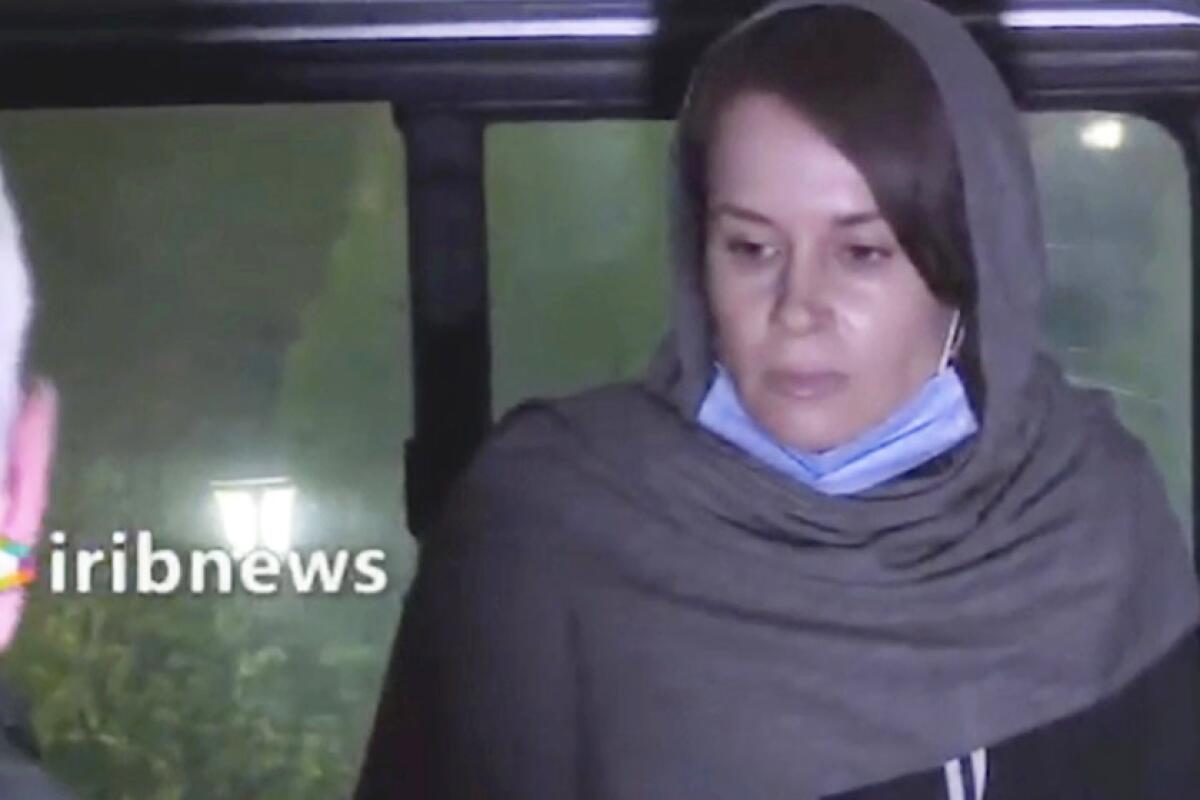Thailand approves transfer of 3 Iranians as Australian is freed

- Share via
BANGKOK — Thai officials said Thursday they approved the transfer back to Tehran of three Iranians who were involved in a botched 2012 bomb plot, as Iran released a 33-year-old Australian academic who was imprisoned for more than two years on spying charges.
Thai officials did not go so far as to call it a prisoner swap or say what involvement Australia might have had in the arrangement. Iranian state TV said Tehran released British-Australian Kylie Moore-Gilbert in exchange for three Iranians held abroad.
Chatchom Akapin, Thailand’s deputy attorney general, told the Associated Press that Thai authorities had approved the transfer of the prisoners under an agreement with Iran.
“These types of transfers aren’t unusual,” he said. “We transfer prisoners to other countries and at the same time receive Thais back under this type of agreement all the time.”
In Australia, Prime Minister Scott Morrison said he was “thrilled and relieved” that Moore-Gilbert had been released but added it would take time for her to process her “horrible” ordeal.
Flight data obtained by the AP showed the plane filmed on the tarmac at the Tehran airport had this week twice flown from Bangkok to Tehran, and then on to Doha, Qatar.
The plane’s tail number links it to an Australian private air carrier called Skytraders, which describes itself as a “principal provider of air services to government.” An employee at the company declined to comment when reached by the AP.
The bomb plot of the three Iranians was exposed in 2012 when an accidental explosion blew apart the Bangkok villa where they were staying. Israeli and Thai officials have said the plot was aimed at Israeli diplomats in Bangkok — though Iran denied the allegations and the men were never charged with terrorism.
Two of the men, Saeid Moradi and Mohammad Kharzei, were convicted in Thailand in 2013. Moradi was sentenced to life for attempting to murder a police officer, while Kharzei was sentenced to 15 years for possessing explosives.
Moradi, a factory technician from Tehran and a former soldier, lost parts of both legs as he tried to flee the villa on a crowded Bangkok street. He was carrying explosives from the house and dropped them in the street as police tried to stop him.
The third suspect, Masoud Sedaghatzadeh, was detained in Malaysia. In 2017, a federal court there ordered his extradition to Thailand.
Israeli officials on Thursday had no immediate comment on the release of the Iranians.
Iran’s report of the prisoner swap was scant on detail, saying only that the Iranians had been imprisoned for trying to bypass sanctions on Iran.
Morrison said he had spoken with Moore-Gilbert on Thursday.
“The tone of her voice was very uplifting, particularly given what she has been through,” Morrison told Australia’s Network Nine.
Asked about the swap, Morrison said he “wouldn’t go into those details, confirm them one way or the other” but said he could assure Australians there had been nothing done to prejudice their safety and no prisoners were released in Australia.
In a statement, Moore-Gilbert thanked Australia’s government and diplomats for securing her release, as well as supporters who campaigned for her freedom.
Despite her ordeal, Moore-Gilbert said she had “nothing but respect, love and admiration for the great nation of Iran and its warm-hearted, generous and brave people.”
Moore-Gilbert was a Melbourne University lecturer on Middle Eastern studies when she was picked up at the Tehran airport as she tried to leave the country after attending an academic conference in 2018. She was sent to Tehran’s notorious Evin prison, convicted of spying and sentenced to 10 years. She had vehemently denied the charges and maintained her innocence.
She was one of several Westerners held in Iran on widely criticized espionage charges that activists and U.N. investigators believe is a systematic effort to leverage their imprisonment for money or influence in negotiations with the West. Tehran denies it. Moore-Gilbert wrote in letters to Morrison that she had been imprisoned “to extort” the Australian government.
Her detention had strained relations between Iran and the West at a time of already escalating tensions, which reached a fever pitch earlier this year following the American killing of a top Iranian general in Baghdad and retaliatory Iranian strikes on a U.S. military base.
Iran state TV aired footage showing her clad in a gray hijab sitting at what appeared to be a greeting room at Mehrabad International Airport in Tehran. She was later seen getting on an Australian-flagged white aircraft, shown to her seat by a man in a suit.
The TV report did not elaborate on the Iranians it described as “economic activists” freed in exchange for Moore-Gilbert. They wore Iranian flags draped over their shoulders, black baseball caps pulled down over their eyes and surgical masks, outfits apparently designed to conceal their identities. Iran’s deputy foreign minister, Abbas Araghchi, welcomed the three Iranians at the airport.
International pressure has been building on Iran to release Moore-Gilbert. She has gone on repeated hunger strikes and her health has deteriorated during long stretches in solitary confinement. Over the summer, she was transferred to the remote Qarchak Prison, east of Tehran, as fears escalated over the spread of the coronavirus in the country’s notoriously crowded prisons.
Moore-Gilbert had appealed to the Australian government to work harder for her release. In her letters to the prime minister, she wrote that she had been subjected to “grievous violations” of her rights, including psychological torture.
More to Read
Sign up for Essential California
The most important California stories and recommendations in your inbox every morning.
You may occasionally receive promotional content from the Los Angeles Times.










